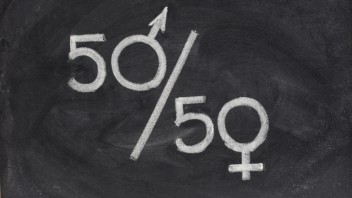
About 18 months ago, I invited the women of the TN staff and board to an evening meeting to begin to explore our experience of working in the Transition movement. We discovered that our reasons for wanting to get together and our perspectives on gender were many and various. But some common themes emerged and we agreed to explore them.
To best do this, we felt it was important that we had a space to talk freely and openly with other women (and this need is understood and supported by the men in our organisation). We have been meeting every 2-3 months or so since then, and it’s a wonderful mix of a lot of great food, fascinating stimulating conversation and a strong sense of mutual support, connection and understanding. We don’t have a set agenda and we don’t aim to produce/do things per se, though usually someone will facilitate a discussion that naturally emerges from the opening check-in. Our group is called Women in Transition (WiT).
We wanted to share with you some of the useful things that have emerged so far, and really welcome your comments and reflections.
My experience
I initiated this group due to a growing interest in gender issues, both within myself and in the world I operate in. Personally, I have been seeing more clearly how my upbringing and wider societal values has led to some over development of my masculine traits, and a disregard for some of the more feminine ones. While I appreciate and value my academic capacity, and ability to get things done which certainly helps in my leadership roles, I am understanding more about how this contributes to a sense of imbalance in both my work life and my personal one.
I am also more aware of, and interested in, my unconscious role in perpetuating gender stereotypes and how I bring that into my work. And when I see others doing it, how can I better articulate the issue and challenge it skilfully? For example, I have been raising the issue of gender in our REconomy national hubs group.
All of the 5 hubs in this initial REconomy group are represented by men, and I am the only woman. When I have tried to discuss this with the group, somewhat tentatively, I have felt the responses reflected a belief that gender isn’t an issue in this case, it’s coincidental that the lead/strategic role is filled by a man and there’s no need for further discussion or curiosity about the issue and our respective experiences.
Now I don’t know anything about the specific gender issues in each of these very different European cultures (Belgium, Croatia, Italy, Netherlands & Latvia) and I’d be interested to hear more from the women involved in the national movements – is this also their experience, that it’s not an issue?
Regardless, my hope is that this post will help me better articulate the issues in future conversations, stimulate a curiosity around our various perspectives and experiences and provide a framing for a more satisfying exchange of views.
Voices
One of the starting points for our WiT group discussion was a desire that a balance of both women’s and men’s voices should be heard speaking publicly for and about the Transition movement. We wanted to understand better what stops many women from taking up leadership/figurehead positions even though they are heavily engaged in the work. How might we support women to develop the confidence and skills they need to volunteer for these roles? And how can we be alert to, and address, the unconscious bias that can prevent women from being chosen as public speakers and representatives of our organisations?
However, as we talked we identified a deeper level of enquiry which felt a little more elusive but just as important (perhaps more important) to the health of groups within the Transition movement.
Values
We discussed the value we place on different qualities, skills, activities and roles and how that influences the way we work together. We know that our culture tends to attach a lesser value to attributes and behaviours which are aligned to the feminine, than to attributes and behaviours which are traditionally viewed as masculine.
The higher value attached to ‘masculine’ roles, skills and activities shows itself in many ways – through the status and authority accorded to certain roles, through the extent to which we notice, acknowledge and appreciate particular skills or behaviour, through wages, through the time and resources we allocate to particular activities. And this unconscious process of attaching a value can happen at many levels – within each of us as individuals (which parts of my personality dominates and which parts do I tend to override?), within groups and within society.
We’ve started to compile a table which pairs ‘feminine’ and ‘masculine’ roles, activities, skills and behaviours. At the moment, it looks like this:
| Feminine | Masculine |
| Facilitators | Key note speakers |
| Co-ordinators/Support role | Leaders/Spokespeople |
| Wisdom | Knowledge |
| Listening | Talking |
| Process | Content |
| Being | Doing |
| Building and maintaining relationships | Getting tasks done |
| Expressing emotions (and intuition) | Thinking and doing |
Of course, both men and women have the capacity to inhabit all of these roles and display any and all of the behaviours listed. Indeed, the cultures within which most of us grew up tended to emphasise the masculine and inhibit the development of our feminine qualities – and as I mentioned earlier this has certainly had consequences in my own life especially around my drive for doing rather than being (explained beautifully in a blog by Sophy Banks), and a reluctance to bring emotions into the work place (or in fact, some other areas of my life).
For me, this has led to me being unable to see some of the feminine qualities in myself and others, and sadly often a dismissal of them. In my role with the REconomy Project – and in my life in general – I am keen to redress this, and where I can bring influence, to help ensure that teams and groups are balanced. It feels especially important that the area of business and economics reflects a more equal valuing of the feminine and the masculine.
Change
We believe that for individuals, groups and communities to thrive, particularly in times of change, uncertainty and fear, we need to develop and maintain a dynamic balance between content and process, between acting and reflecting, between talking and listening, between the feminine and the masculine.
We see the need for us to be clear, open and positive about the value that we attach to both the feminine and the masculine within our organisations. We know this will require us to be alert to the ways that our language and decisions can so easily overlook or minimise the contribution made by the feminine.
Transition is all about envisioning and then working to create a different way of living. If we don’t ensure these new systems are balanced from the outset, then we are simply re-creating some fundamental flaws of the current paradigm that are not only massively unjust – excluding the full participation of women – but which ensure everyone suffers from a society bereft of the more feminine qualities including connection, love and nurture.
This may not be easy for any of us given the assumptions, values and habits we have picked up from the dominant culture within which we live. It can feel difficult to raise these issues, when the group leans more towards the masculine side. Women often report feeling unheard or side-lined when they raise these sensitive topics and challenge the status-quo, even in our own movement and organisation.
Interestingly, going back to the imbalance of the REconomy national hubs group, we have 5 new hubs joining the group and 4 of these will be led by a woman. While it balances the group overall, it raises more interesting questions about the practical implementation of balance – ideally would we want leadership shared by a man and woman in each hub? Or a commitment from the leader, regardless of their gender, to equally value and integrate all qualities, along with an attempt to ensure the wider team has balance overall?
Impacts
We notice that one of the outcomes of our WiT meetings has been more of a sense of shared responsibility to call attention to the issues, and mutual support to help ensure they are fully heard. We also notice that both women and men within our organisation are becoming more aware of gender balance of communications, and speakers at events, for example, as well as who fills which roles.
We’re keen to continue to experiment with ways of working which better integrate content and process, so that we pay attention to relationships and emotional impacts whilst taking decisive powerful action to bring about the changes we want to see in the world. And we want to share this exploration and these experiments with the wider movement, so that we can learn from each other about how to live and work together in a way which is truly satisfying and balanced.
Questions
Addressing gender imbalance overall is a massive topic and remains an enormous challenge. Hopefully this post has started to outline at least part of the issue as relevant to Transition in a way that helps us understand it, articulate it and begin to challenge things where necessary.
If you are interested in looking at this issue in your own work and organisation, here are some questions that might be useful to reflect on individually or in a group:
- In the table above, what qualities to do I/we most value in our work?
- Who typically does the public speaking? What enables them to do this?
- Whose voices are not heard? How about public communications – films, website information, posts?
- Who is in a position of leadership? What enables them to do this?
- How do women in your organisation feel about gender balance? How do the men feel?
Meanwhile our WiT group continues to meet and we will report back on what emerges. It also includes some of the women leadership from Transition Town Totnes. We’d love to hear about your experiences and your thoughts on whether gender is an issue in Transition.
Finally, we’re aware there are other highly connected issues including class, diversity, privilege and access to power that are perhaps even more strongly present in our organisation – we’re an all-white and predominantly middle-class staff and board, and we know that this demographic is extensively reflected in the wider movement. We acknowledge it’s difficult to fully separate gender as an issue, and as our organisation continues to try to find a way to address these complex intertwined issues over time, we will continue to share our thoughts and experiences with you, and ask you to share yours with us.
Authored by Fiona Ward & Sarah McAdam with input from Sophy Banks and thanks to all others for comments. This blog also appears on the main Transition Network website.
Image credits: main image 50/50.










I’m a middle-aged, middle class white man heavily involved with Transition. One of the pleasures of working in Transition has been coming across so many good people doing good work. It is only articles like this that cause me to consider their gender, race or any other stereotype. Perhaps because I am who I am (and can’t help it) I find it difficult to imagine anything other than appreciating people for who they are and what they do. I can’t get too excited about “gender issues”. If I felt someone else had an issue, I’d try to help as best I could, but is gender really as important in Transition groups or leadership as the problems we are jointly, collectively, trying to tackle ? Having said that my local group has a predominance of very able, articulate and capable people who just happen to be female, so what does that mean or say ?
Thanks for this insightful post. It touches on a very important issue and I am glad you have created an opening to begin addressing it. Traditionally feminine qualities have been demeaned and devalued for so long that it can be very threatening to even raise the issue for fear of seeming irrational. We need both the masculine and the feminine to work together. We need a balance between being and doing. We receive a lot of messages that value doing over being, leading to the kind of workaholic behaviour that causes burn out as well as serving to make access to our inner life inaccessible due to time and relationship constraints. I recently wrote a post about this which – though not explicitly about gender – may be of interest. http://somesmallholding.wordpress.com/2014/10/10/bridging-the-divide/